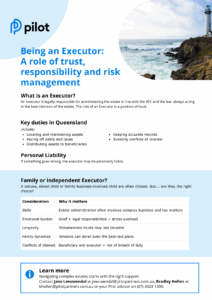An estimated $3.5 trillion in wealth is set to transfer between generations in Australia over the next 20 years, according to AMP research. This seismic shift often referred to as the “Great Wealth Transfer”, is reshaping estate planning, with significant implications for families, advisors, and the broader economy.
At Pilot, we’ve seen how rising estate values and complex family dynamics are driving a sharp increase in disputes and litigation. As accountants, we know estate matters are rarely simple. This article offers insights into the key risks and considerations shaping estate administration in Australia today.
The role of the Independent Executor
Choosing an Executor is one of the most important decisions in estate planning. While it’s common to appoint a family member, this can sometimes lead to conflict. This is especially the case when the executor is also a beneficiary or involved in the family business.
We’ve seen cases where a lack of transparency or perceived bias has led to costly litigation and fractured relationships.
“It’s a really important decision. You want your affairs handled properly after you’ve gone, and you want the family harmony to continue.”
Jane Leeuwendal, Associate Director – Forensic.
That’s why Pilot have increasingly been called upon to act as independent executors or trustees. Our role is to bring objectivity, financial acumen, and a deep understanding of fiduciary duties to the table – ensuring the estate is administered fairly, efficiently, and in accordance with the will and the law.
Tax: The hidden complexity
Tax is often the most underestimated aspect of estate administration. From capital gains tax on the family home and investment portfolios, to the treatment of superannuation and cross-border complications, the implications can be significant, and mistakes can be costly.
For example, the main residence exemption can extend for two years after death, but if this deadline is missed and the Commissioner doesn’t otherwise apply discretion, unexpected tax liabilities can arise. Similarly, when beneficiaries live overseas, transferring non-real property assets can trigger capital gains tax liabilities for the estate, even if the assets aren’t sold. Additionally, when superannuation is passed to non-dependants, it may come with a tax bill that beneficiaries aren’t prepared for.
We help executors and beneficiaries navigate the complexities of Australia’s tax laws as they apply to estates. Executors often want to protect themselves from liability to the extent possible, and if there are “grey areas” in respect of tax, then Pilot can help by assisting the Executor to prepare private ruling applications. The Commissioner of Taxation provides binding rulings to taxpayers (when requested) in respect of matters of fact and law, providing comfort and certainty to the Executor.
“Whilst private rulings provide certainty, applicants should be aware that the rulings can go either way. It might go in your favour, or it might not. There are no guarantees.”
Tom Howard, Associate Director – Taxation Advisory.
Disputes and Due Diligence
Disputes often arise from estate mismanagement including poor recordkeeping, unclear intentions, or perceived unfairness. In these cases, we support legal teams by tracing transactions, reconstructing books, and providing expert reports or court evidence. We also model “what-if” scenarios to quantify potential losses or damages – critical in litigation.
But prevention is better than the cure. That’s why we advocate for early, open conversations with clients and their families. Understanding the structure of the estate, the roles of each party, and the tax implications before death can prevent confusion and conflict later.
Jane Leeuwendal notes, “If a dispute does arise, there can be merit in getting an independent Executor or trustee. It can preserve the estate, we can undertake investigations, and we can assist with resolving the dispute—hopefully as quickly as possible.”
It takes a village
Administering an estate is not a solo act. It requires a coordinated effort between accountants, lawyers, financial advisors, insurers, property agents, and more. At Pilot, we work alongside a trusted network of professionals to deliver the best outcomes for our clients.
We bring deep expertise in tax, financial analysis, and estate administration. And we know that when we work together, we can help families preserve their wealth, honour their wishes, and maintain harmony through even the most challenging transitions.
Conversations should start early and by having the right people around you, you can make sure your legacy is continued in the way that you intended.
Kylee Smith, Partner – Taxation Advisory.
Learn more
Our experts break down the key risks, duties and practical solutions in this on-demand webinar and easy-to-read guide, which you can view here.
Contact Pilot
If you have clients navigating estate planning or administration, please contact Jane Leeuwendal, Tom Howard, Kylee Smith or your Pilot Advisor on 07 3023 1300.
